|
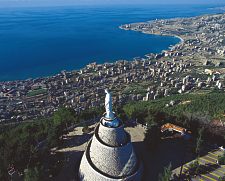
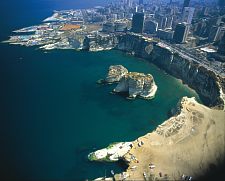
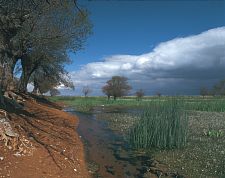
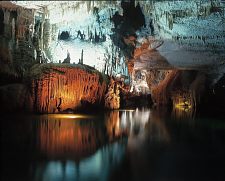
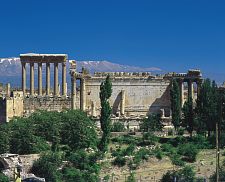
| |
Lebanon's hollow victory
As bands played and flags were waved, Syrian troops left Lebanon
after 29 years of occupation
By Robert Fisk at Masnaa frontier post, Lebanon
27 April 2005, ©
The Independent
They've gone. After 29 years in Lebanon, the very last Syrian soldiers " men who
were unborn when their army arrived " traveled through the border station here,
making victory signs and waving. What victory? What was there to wave about?
Mission accomplished. That was what we supposed to believe: this was an army of
peace-keepers returning triumphantly home to Syria after decades of sacrifices.
They even took their statues with them. Some Lebanese didn't know whether to
laugh or cry.
But at least " and from these maudlin occasions one tries to see little flashes
of dignity " the Syrian army, which originally came here on an Arab League
peace-keeping mandate in 1976, was not humiliated in its last hours. The
Lebanese army paraded hundreds of troops alongside the red- bereted Syrians and
both presented arms to their respective commanders. There was a tinny Lebanese
band and a rather more melodious band from the Syrian army that struck up "The
Keel Row", to which the Syrians " rather than march " actually bounded along in
time to the music, running past the reviewing stand of Lebanese and Syrian
officers. Across the border in Syria, it all looked good on the state-run
television, not least because a party of Syrian civilians had been brought by
truck to the frontier to shower their soldiers with flowers.
The Syrian departure still seems unreal to many Lebanese despite the villagers
from Majdal Aanjar, who performed the "dabke" dance at the frontier to express
their joy at the final withdrawal, and their mayor who said that at last he was
no longer suffocated. I arrived to report in Lebanon the day after the Syrians
crossed the frontier in their tanks in June 1976 and yesterday I realised that I
had outlasted them.
Having been shelled by them in east Beirut, shelled again in the Bekaa city of
Zahle " a massacre which was not, of course, mentioned yesterday " and almost
killed with them under Israeli air raids, they had become a fixture in my life.
Always the same menacing "mukhabarat" men at the Chtaura crossroads, always the
same military policemen outside Baalbek, the same scruffy Special Forces with
their green helmets and Kalashnikovs and bayonets in the filthy, abandoned
houses on the mountain road at Aley. So should we laugh or cry?
Those who cried were able to visit the dungeons where, years ago, they were held
and tortured. Those who smiled included General Ali Habib, the chief of staff of
the Syrian army, and the much more sinister figure of General Rustum Ghazale,
Syria"s head of military intelligence in Lebanon. The UN investigation team due
to arrive here next week wants to know more about what General Ghazale knew
about the murder of the Lebanese prime minister Rafiq Hariri on February 14.
General Ghazale knows all, the Lebanese believe.
But yesterday it was General Habib who did the talking, praising the 250 Syrian
Special Forces standing before him on the old French airbase at Rayak where the
Lebanese had been prevailed upon to thank their military guests for their
overlong stay. General Habib talked of sacrifice and laid a wreath before a
newly built memorial to Syrian troops who have died in Lebanon since 1976. No
one mentioned a figure, of course, only the battle against Israel which they
fought in 1982. The true figure of Syrian dead is, in fact, about 12,000.
But it was a bleak moment for Syria. Her power and influence in Lebanon were
trickling away even before the last soldiers departed. Ali Haj, the Lebanese
officer who controlled the Internal Security Forces " the man who planted
evidence on the scene of Hariri"s murder in Beirut " has been swept away. So has
Jamil Sayed, the head of General Security. And at the weekend, Raymond Azar, the
head of Lebanese military intelligence, left mysteriously for Paris. He was on a
"mission", according to the army. So why did he flee with his wife and two sons?
Is he going to spill the beans to the French? All these were Syria's pets in
Beirut; powerful " some might say dangerous " men. And they, too, have now gone.
The Syrians" sin, of course, was to outlast their welcome. We were not meant to
think like that at Rayak yesterday. The Syrians, whose treatment of journalists
normally runs between threats and shrieks of "no pictures", were sweetness and
light. The Special Forces men wore smart camouflage fatigues, spotless poppy-red
berets and marched around the parade ground for the television cameras.
But you noticed the corners that had been cut, the hint of Syria's dire economic
burdens. The tanks they have been taking out of Lebanon these past three weeks
were rusty. The Lebanese army, now 60,000 strong, wore newer uniforms and
marched with better precision and their armoured vehicles were all freshly
painted. There is an illusion here, needless to say, because the Lebanese army
cannot be used to quell civil disturbance " or civil war " lest it would, like
its predecessor in 1976 and again in 1984, divide along sectarian lines.
Which is why one Syrian soldier, back in March, told me that his army would
eventually have to be sent back to Lebanon when its war restarted. Yet I do not
think so. Lebanon's new independence and its forthcoming "democracy" " this word
should remain in quotation marks until after the May 29 elections " is supposed
to bring the stability that the country needs after Hariri's murder.
And Syria, of course, leaves some very real bodies in the graves of Lebanon.
There is Hariri. There was President Rene Moawad. And the Druze leader, Kemal
Jumblatt, and the Grand Mufti, Sheikh Hassan Khaled. All had fallen out with
Syria. All " save for Jumblatt " were murdered in massive bomb explosions. Which
is why the Lebanese cry for "the truth" since Hariri's death was built upon a
pile of other corpses. Will we find out? Can we discover the secrets of the past
29 years?
"God, Syria and Bachar only," is what the Syrians shouted at us as they crossed
the border at Masnaa yesterday. They had already freighted out the steel statue
of Bachar's dead brother, Basil, and several statues of their father, Hafez "
their fate was obviously clear if they were left behind " so God, Syria and
Bachar raise some interesting problems. I'm not sure about the God bit. Syria
will continue to exist. But will Bachar's regime?
|